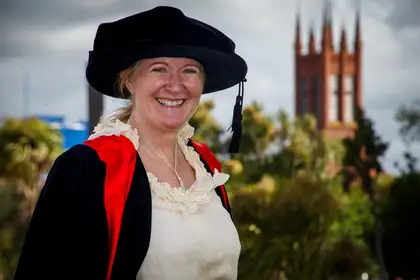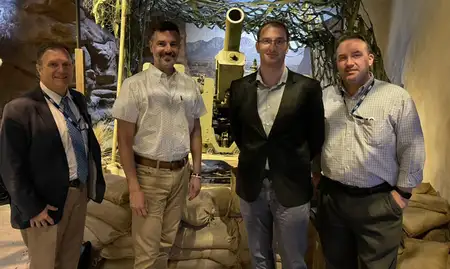
Nurses in the Armed Forces are responsible to their employers for meeting the expectations of their roles but are also accountable to nursing regulatory authorities for maintaining professional standards. Through her study, Dr Sheard examined how members of the Royal New Zealand Nursing Corps balanced their dual accountabilities and how this affected the degree of autonomy they possessed.
With both parents as proud military veterans of the NZDF, Dr Sheard was inspired to embark on her military career after successfully registering as a nurse at Whangārei hospital. While in the Army Dr Sheard was seconded to the Royal New Zealand Air Force for several years where she was deployed to East Timor and Bamiyan.
“Being a part of the Defence Force is a lifestyle, you’re creating lifelong friendships and habits. My parents taught me what it meant to be in the Army and the self-discipline it would take.”
During her military career, Dr Sheard completed her Postgraduate Diploma in Defence Studies through Te Kunenga ki Pūrehuroa Massey University. As advised by her seniors, she completed a Master of Strategies Studies through Victoria University, leading to her promotion to Lieutenant Colonel and Director of Nursing Services.
“I had assumed that given Defence's demands and culture, nurses would adhere closely to that brief. But I discovered that military nurses approached the nursing brief from the perspective of a nurse, putting patient care ahead of the Defence policy,” Dr Sheard says.
For many nurses, being a full member of the Nursing Corps means being deployable. Nurses compete for selection for military operations and prioritise the attainment of capabilities that will qualify them for deployment. Criteria are set for general deployability that focus on military skills and neglect nursing competence.
“Nurses were very clear that patient safety underpins the foundation of their work, not undisputed obedience to instructions or the concentration on attaining operational goals.
When combat skills are valued over professional knowledge, when being seen to be working hard is valued over invisible work, everyone can be put at risk.”
Dr Sheard found the subconscious infiltrators of nurses’ professional selves were characterised as competition and status. Unlike the military, Dr Sheard expressed that rank does not hold status in clinical settings, but clinical proficiency does.
Senior nurses work in management and are deemed ineligible for deployment. With deployment eligibility held in high regard by military ideology, senior nurses struggle to enforce judicial discipline and are not as respected as their military leaders.
“If the work is unseen, the value is not acknowledged in the military. Those who reside furthest from the weapons and furthest from soldiering, are the least valued. Being non-combatants, non-discipliners and not adhering to leadership philosophy all contribute to the idea that nurses are not true officers.”
Dr Sheard concludes that for nurse regulatory authorities to support the existence of the Nursing Corps, they must acknowledge the competency and capability of a nurse cannot be measured the same as a soldier. The benefit of the patient will always come before anything else despite the moral and professional obligations that come with the job of a military nurse.
As nurses make up most health practitioners in the NZDF, Dr Sheard anticipates contributing to the international body of military nursing research and giving recommendations to the NZDF on the safe and effective use of its nursing professionals.
Take your career to the next level. Apply now for our post-graduate courses.
Related News
Nursing graduate following in parents’ footsteps
Campbell Thompson’s parents were the inspiration for him to make a career change to become a nurse.

Opinion: The complexities of mental health and the role of nurses
Each year around one in five New Zealanders experiences mental illness or significant mental distress, and between 50 and 80 per cent of New Zealanders will experience mental distress or addiction challenges, or both, in their lifetime. The role that mental health nurses play in caring for these people should not be overlooked.

PhD student attends prestigious military history seminar in the United States
Shaun Mawdsley, a PhD student on the Auckland Campus, was recently selected for a prestigious fellowship in the United States.
